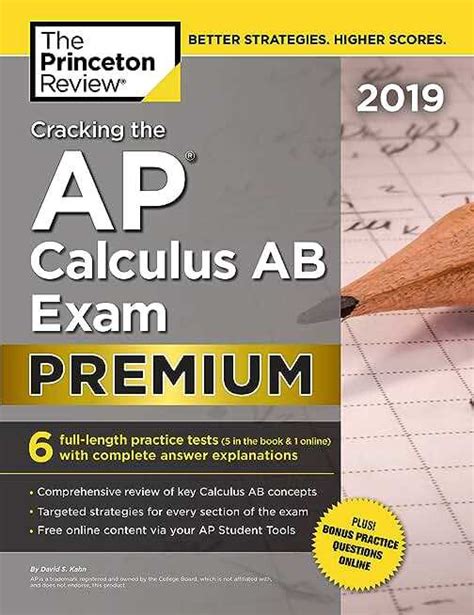Introduction
The Advanced Placement (AP) Calculus Free Response Questions (FRQs) are an integral component of the AP Calculus exam. These questions are designed to test your understanding of the fundamental concepts of calculus, your ability to solve complex problems, and your communication skills. Mastering the AP Calculus FRQs can significantly improve your score on the exam and increase your chances of earning college credit.

Types of FRQs
The AP Calculus FRQs fall into three main categories:
- Problem Solving: These questions typically involve solving a problem that requires the application of multiple calculus concepts.
- Communication: These questions ask you to explain a calculus concept or provide justification for your solution.
- Synthesis: These questions combine problem solving and communication elements, requiring you to solve a problem and then explain your solution.
Scoring Rubric
The AP Calculus FRQs are scored using a detailed scoring rubric that evaluates your:
- Accuracy and completeness of your solution
- Clarity and organization of your response
- Correct use of calculus terminology
- Logical flow of your argument
- Effective communication of your ideas
Preparation Strategies
Preparing for the AP Calculus FRQs requires a solid understanding of the calculus curriculum, practice solving a variety of problems, and developing effective strategies for communicating your solutions. Consider the following tips:
- Master the Concepts: Thoroughly review the course material and focus on understanding the key concepts of calculus.
- Solve Practice Problems: Practice solving a wide range of FRQ-style problems to improve your problem-solving skills and identify areas where you need improvement.
- Analyze Past FRQs: Study past FRQs to become familiar with the format and types of questions that may be asked.
- Develop Your Communication Skills: Practice writing clear and concise solutions that demonstrate your understanding of calculus concepts.
- Time Management: Manage your time wisely during the exam by first reading the question carefully and then allocating your time accordingly.
Common Mistakes to Avoid
To maximize your score on the AP Calculus FRQs, avoid these common mistakes:
- Insufficient Accuracy: Ensure that your solutions are not only conceptually correct but also accurate in terms of calculations.
- Poor Organization: Present your solutions in a logical and organized manner, making it easy for the grader to follow your thought process.
- Ambiguous Language: Avoid using vague or ambiguous language. Use precise calculus terminology and provide clear explanations.
- Lack of Justification: When asked to explain your solutions, provide detailed justifications for the steps you take and the assumptions you make.
- Time Wasting: Do not spend excessive time on questions that you are not confident about. Move on to other questions and return later if time permits.
Table: Key Concepts for FRQs
| Concept | Description |
|---|---|
| Derivatives | Rate of change of a function |
| Integrals | Area under a curve |
| Limits | Behavior of a function as a variable approaches a specific value |
| Continuity | Smoothness of a function at a specific point |
| Applications of Derivatives | Optimization, related rates |
| Applications of Integrals | Volume, surface area |
Table: Effective FRQ Strategies
| Strategy | Description |
|---|---|
| Read the Question Carefully | Understand the specific requirements and the context of the problem. |
| Plan Your Solution | Outline the steps you will take to solve the problem and identify any potential difficulties. |
| Show Your Work | Clearly present all your calculations and steps in a logical order. |
| Provide Justification | Explain your reasoning and any assumptions you make throughout your solution. |
| Manage Your Time | Allocate your time wisely to ensure you have sufficient time to answer all the questions. |
Table: Common FRQ Pitfalls
| Pitfall | Example |
|---|---|
| Conceptual Errors | Misunderstanding the concept of a derivative or integral |
| Computational Mistakes | Incorrect calculations or rounding errors |
| Poor Communication | Using ambiguous language or failing to provide clear explanations |
| Insufficient Justification | Omitting details or explanations for your solution |
| Time Management Issues | Spending too much time on one question or running out of time |
Table: Applications of Calculus
| Application | Field |
|---|---|
| Optimization | Business, engineering |
| Related Rates | Astronomy, physics |
| Area and Volume | Geometry, architecture |
| Fluid Dynamics | Hydrology, meteorology |
| Probability and Statistics | Finance, healthcare |
